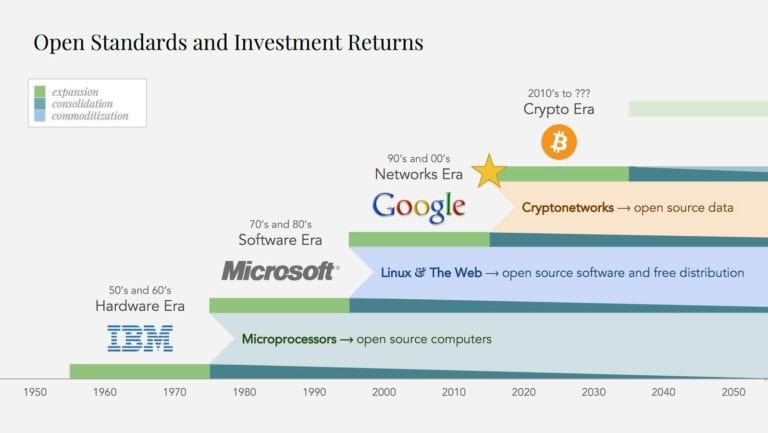Open-Source Social Media and Web 3.0

As the zeitgeist continues to become increasingly shaped by social media engagement and political views become more polarized, it's becoming clearer that we are still fundamentally figuring out how to govern content and moderate these relatively new networks. In their earliest days, when times were simpler, Facebook, Twitter, et al were champions of free speech and free expression. It was something overtly mentioned in their core principles – that outside of illegal content, they would not censor and instead promote viewpoint diversity and neutrality. However, this was before the platforms were fully scaled out with the level of usage and societal impact we see today. It was also before the political establishment and mainstream media outlets were so deeply disrupted by social media enabling new ways to compete with traditional media. Social networks created unprecedented information transfer at scale over the last decade, which has now itself formed a new layer of centralization.
If the goal of social media is to be neutral, give everyone a voice, and allow individuals to amplify themselves creatively, politically, in business, and beyond, then it is a clear net positive in the world. This is now in question, when governments and political interests become prioritized over these goals and when a clear bias foments over time. People are beginning to lose trust in these platforms for a variety of reasons.
We are far from the Walter Cronkite era of public information and media with independent sources and solo investigative journalists achieving livelihood and funding directly from the people via Substack and other platforms emerging rapidly as more trusted, less biased sources. What's interesting is that we had a much bigger sense of trust in society in the Cronkite days of media, while in the present hyper-info era, we are reaching all-time lows in trust across many institutions and in each other. This is perhaps just a correlation with a million variables and historical factors, but it's likely in part because humans generally find it easier to collectively conform to singular sources of information. We could also add, the technol0gy-enabled modern comforts that we take for granted versus the past have simply created more time to ponder and care about these things in the first place, along with politics becoming the new blood sport. Our hiearchy of needs are largely met and there is now a mixing of our "public vs private" lives due to social media giving everyone a voice.
We now wield the power of the world's information in our palms. We've opened up a plethora of access to new intel, new perspectives, analysis and data sources over the last 20 years. Even though this connectivity may in part contribute to fragmentation and ironically, human disconnect in some ways, if you ask the average person, they would rather have the freedom to be heard and have access to many perspectives. Even though humans oddly seem to fall into the trap of groupthink and authoritarianism, we still ultimately want to be free at large. We must take a long term, first principles approach in ensuring these platforms stay neutral and not become monoliths ultimately controlled by governments and opaque institutions. Ignorance is not bliss, even if it were to lead to a manufactured trust as we see in countries like China. We also believe the nature of information sharing can itself be improved, to help people find signal and high value connections among the noise. If you zoom out, we are still early in this new paradigm of digital social connectivity and there is much to optimize.
With freedom and access to information comes great responsibility. Many are looking to throw freedoms away for short term political benefits or status games. We need to find and rebuild trust for the information age – and the way to do this is via open-source transparency, cryptography, and decentralizing networks.

With this endless stream of social data comes massive complexity, especially in sociopolitical realms where narratives and perspectives collide. These platforms are now used to shape sentiment, election cycles, and news cycles. This is largely why we see the increasing moderation issues, censorship, and tensions today. More access has opened up more heterodox perspectives and has brought more ideas to the table. We believe more speech is better but unfortunately now that this great unlocking of information seems to threaten the established status quo, social platforms have been pressured to throttle, censor, and ban thousands of people over the last few years purely based on politics and ideas – even a sitting president (which other leaders around the world condemned). Social media companies, or any company for that matter, should not become arbiters of truth, especially at the behest of political interests and "fact checkers" who are often blatantly subjective. A level of moderation is of course required for illegal content, but when big tech companies are simultaneously carrying out these decisions based on political pressures, are we really in a free market anymore? Where do we draw the line?
Section 230 gives big tech companies immunity from being held liable over user content. It's actually crucial from a pure legal perspective given our societies, particularly the US, are now built on layers upon layers of endless lawfare. It allows any new potential social media company to compete and not have to moderate content as publishers. Gutting Section 230 would crush the ability for new competition to emerge because only the big guys would be able to comply with content moderation requirements at scale (along with having a bulwark of lawyers at hand). The main issue is that big tech platforms are clearly editorializing content and breaking these guidelines, yet still maintain their Section 230 status. They receive all the benefits from the regulation but still continue to pick sides and winners and censor based on political pressures. It is not about removing or adjusting Section 230, it is about enforcing it properly. This is why trust in big tech is quickly decreasing (though still higher than media and government). There is a loose claim of neutrality with nothing to back it up anymore.
Additionally, we saw the conservative social app Parler simultaneously deplatformed from all their tech providers and the mobile app stores. We are not particularly fans of the site, but what's odd about this is big tech firms held Parler accountable for the content on their social network as if they did not have Section 230 protection, yet 'big social' reaps the benefits of Section 230 immunity and don't hold themselves to the same standards. Facebook and its Messenger currently account for a large number of child abuse reports and specifically 94% of all cases reported by tech companies. Should the app stores and cloud providers all simultaneously deplatform Facebook and hold them accountable? This is one of many examples of a double standard and there is just no consistency in this area right now. This also isn't a "Left-Right" issue, it's about not allowing any central authority to gain too much power. This is something that can and will impact both sides of the political spectrum.
However, we don't believe endless calls for anti-trust are the best solution. "Breaking up" big tech companies won't do much to solve these issues and only serves as a major de-motivator to startups building towards potential future M&A opportunities. It would hinder innovation while not accomplishing much in practice. The only arguable pure monopoly in big tech right now is Google in some specific areas like search. Social network market share is certainly centralized around the "winners" of the post-dotcom bubble era, but to think we are eternally stuck with only having these choices and new platforms won't emerge to challenge them is ridiculous and ahistorical. If you zoom out, it is simply too early to call these companies natural, inevitable monopolies that can never be challenged. They can and will be–we're already beginning to see the tides shift, although it's still early.
We are seeing new social apps with novel business models, content formats, and incentives. We already saw an unprecedented surge towards encrypted messaging apps due to WhatsApp's new unfavorable privacy rules. The collective movement of the consumer can be massive, we just need to keep building and users will "vote with their thumbs" over time. This is the best way to challenge incumbents, while nationalization or government intervention is what will turn them into true monopolies and federalized back-offices.
If 'big social' refuses to be neutral platforms, they should be treated as publishers. Editorializing by Facebook or Twitter, even via cloudy algorithms, should not be allowed in maintaining their 230 status. This would solve a lot of the initial problems of bias. From there, perhaps some kind of internet free speech protection clause could be weaved into Section 230 or elsewhere. These are lighter solutions that don't give government too much power and also allow time for competitors to naturally emerge.

Perhaps most importantly, the current social media business models are much like a quasi-feudalism. The platforms are free and accessible but users have no concept of owning their data or identity. You rent your time and energy on these platforms in exchange for data with no connection to the network's success, limited privacy, and no direct form of content monetization for the average user. This is not an ideal way to align communities, and it's starting to show.
Big technology companies have been naturally disrupted in the market by challengers before. While anti-trust has been used for businesses that heavily rely on real estate, hardware, and geography (e.g. telecommunication companies, big oil, etc), it is likely much more nuanced when talking about software given its nature of rapid change and scaling. There could be a few valid, very specific anti-trust cases with big tech today but they are unlikely to be as impactful as people may believe in terms of reducing market share (not to mention, other second order effects). We are firm believers in creative destruction to make change happen at scale and without coercion as a basis. Specifically with open-source software, network effects drive adoption (like we see in Bitcoin and Ethereum), which is why we believe crypto will be a major component of the next wave of social apps.
We're already seeing the beginnings of this movement. It is not a law of physics that the market share of big tech companies and social networks must remain where it is forever.
This is a problem we saw years ago that was only going to get worse as polarization continued to increase. We perhaps hit peak centralization after the 2020 election, when every single big tech platform simultaneously deplatformed a sitting president and many other accounts on both sides of the aisle. The deplatforming will only get worse as politicians call for more online censorship and ramp up pressure to control the narrative online. But politicians are always a step behind entrepreneurs and the Web 3.0 movement is already well on it's way. It's becoming clear that people are looking for something new, regardless of political affiliation.
We believe many of these problems can be solved through three basic principles:
1. Prioritizing Transparency via Open-Source
2. Data Ownership / Crypto Infrastructure
3. Community-Driven Governance

Minds was one of our earliest seed investments back in 2016, shortly before they raised an equity crowdfunding round via our other portfolio company Wefunder, followed by a Series A round in 2018. They are pioneers in the free speech and internet freedom movement and have recently seen user growth explode to record highs due to frustrations over censorship, user misalignment, and privacy concerns on other platforms. Prior to that, hundreds of thousands of users have been onboarded from both Thailand and Vietnam, where social and communication platforms were censored by the government.
"The ugliness of ignorant ideas is BEAUTIFUL compared to the horror of everyone's mouth sewn shut" ~Bill Ottman, CEO of Minds
Minds is a bunker for people who seek free speech ideals but it also aims to be much more than that, as the team builds out broader crypto functionality, censorship-resistance, hosting, decentralized identity, and privacy features. Minds wants content creators and all users to have a stake in what they refer to as "The Contribution Economy" to help govern the network and earn crypto based on their time and energy spent on the network.
Open-source solves the transparency issue in social media by allowing a peer-review of algorithms and data feeds. Third parties can verify that platforms are remaining as neutral as possible and ensure privacy is being prioritized. After all, algorithms are written by humans and humans are highly biased. Why not have checks and balances via open-source repositories?
We believe new crypto-based infrastructure will allow a new layer of the internet to be built without censors, gatekeepers and rent-seekers. We think of it like digital cities with commons areas and their own transparent, open-source governance. There will still be private, for-profit 'storefronts' in the digital cities you can 'walk' into for a variety of services, but the difference is you will own your identity and data as you move between these stores. Banking and financial assets will also be held directly and owned by you via your cryptographic keys. No longer will you just be a serf, giving up your data for the ability to use each service. Different business models and community governance that aligns incentives will emerge from this, we are already seeing it happen in areas such as DeFi. We believe Web 3.0 will translate into aspects of social media, which will organically compete with big social networks on the grassroots level. This is how categories are challenged.
There are already many alternative social platforms but only a few have the real potential for adoption. We believe success will require onboarding users in the current transitional phase we're in to lead the charge, along with decentralizing the network over time and creating hardened foundations at the hosting, DNS, data storage, and protocol layers.
We are bullish on Minds in the long run because of their founders' vision and passion and their already robust, growing community. As of now, it's by far the largest crypto-based social network by engagement, signups and monthly active users (MAUs). But we are certainly open to other complementary investments in the Web 3.0 social space.
Below, you can find additional media on Minds
Minds / Joe Rogan interview
CoinDesk
TechCrunch
Wired
Minds Lightbulb Art Credit: https://www.minds.com/neutronboar
Follow me on Minds here!

